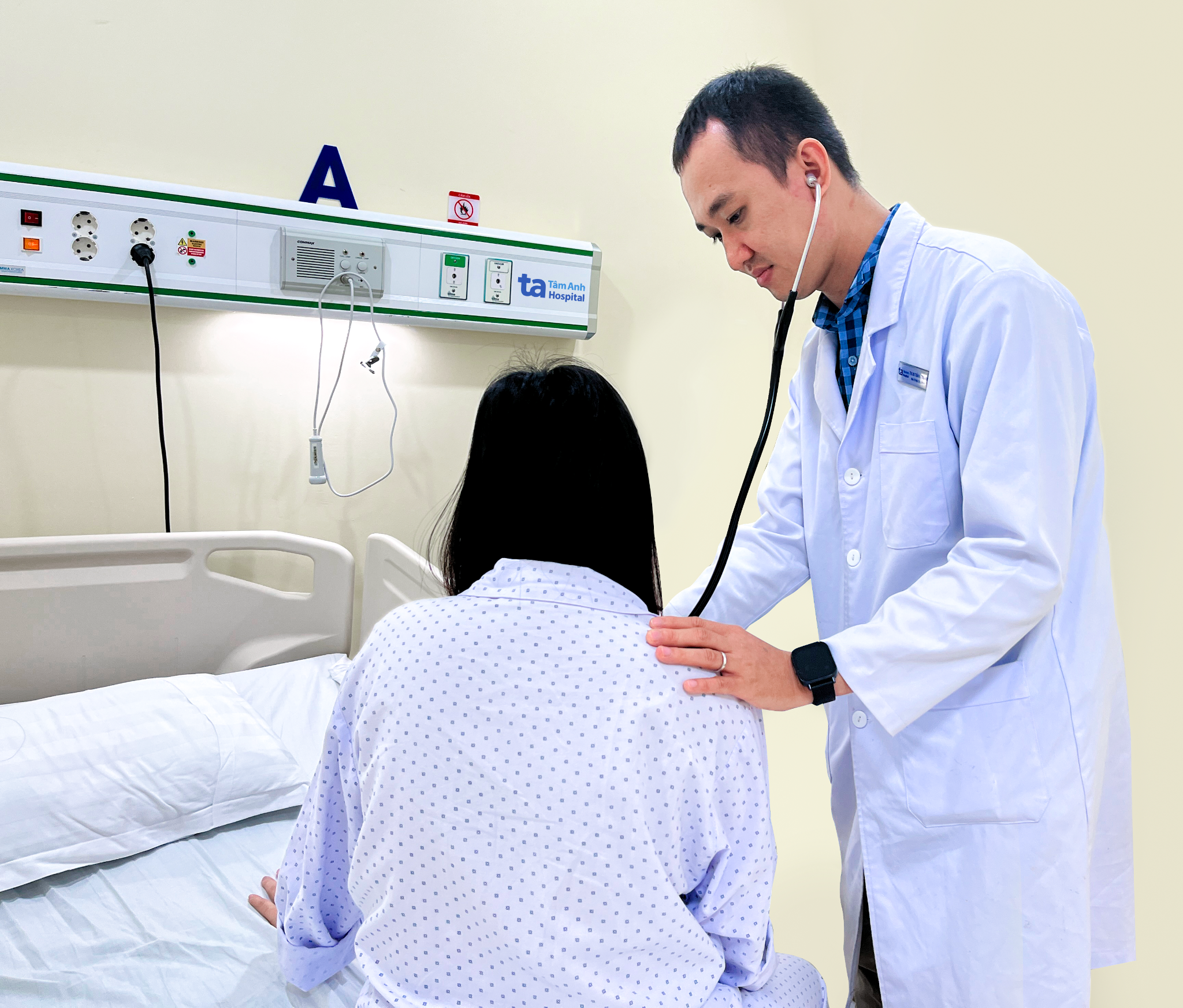Ngoc, who has polycystic ovary syndrome, previously miscarried at 18 weeks after in vitro fertilization (IVF). During her second pregnancy, at 11 weeks, she experienced sudden, severe abdominal pain around her navel radiating to her back, accompanied by nausea. An abdominal MRI revealed a thrombus filling the portal vein and superior mesenteric vein, almost completely obstructing them. Doctor Tran Huu Danh, from the Department of Internal Cardiology at Tam Anh General Hospital in TP HCM, said this was the cause of her week-long abdominal pain and vomiting.
The portal vein carries blood from the digestive system (stomach, intestines, pancreas, and spleen) to the liver. When a blood clot forms there or spreads to nearby veins, blood flow to the liver is obstructed, threatening liver function and overall health.
 |
Doctor Danh checks the patient's health after a week of treatment. Photo: Ha Vu |
Doctor Danh checks the patient's health after a week of treatment. Photo: Ha Vu
Doctor Tran Vu Minh Thu, Head of the Department of Internal Cardiology 2 at Tam Anh General Hospital in TP HCM, ordered tests to assess her blood clotting status. The results revealed she was positive for systemic lupus erythematosus and antiphospholipid syndrome (APS), an autoimmune disorder that causes the body to produce abnormal antibodies that attack the lining of blood vessels and activate the clotting system.
According to Doctor Thu, about 20-40% of lupus patients have antiphospholipid antibodies, and some of these are diagnosed with APS. The combination of lupus and APS significantly increases the risk of thrombosis, not only in the deep veins of the lower extremities but also in less common locations such as the portal vein, cerebral veins, or visceral veins. In Ngoc's case, the antibodies triggered a biological reaction that led to a blood clot in the portal and superior mesenteric veins.
Treating this case was challenging because the patient was in her first trimester and had been trying to conceive for years. The medical team developed an optimal treatment plan using pain relievers and anticoagulants to manage her condition without harming the fetus. After a week, an ultrasound showed a significant reduction in the thrombus. Ngoc's abdominal pain subsided, she was able to eat and walk normally, and the fetus was developing well. She was subsequently discharged.
Systemic lupus erythematosus is an autoimmune disease that can affect various organs, including the skin, joints, kidneys, blood vessels, and digestive system. Antiphospholipid syndrome disrupts the balance of coagulation and anticoagulation, increasing the risk of blood clots. When these two conditions coexist, the risk of thrombosis and pregnancy complications (miscarriage, premature birth, and preeclampsia) is elevated.
Women with lupus or APS should only become pregnant when their condition is stable, adhere to treatment and regular check-ups, maintain a healthy diet, engage in light exercise, and get adequate rest. They should seek immediate medical attention if they experience any unusual symptoms such as fatigue, fever, joint pain, mouth sores, hair loss, anemia, or swelling and pain in the limbs. Early detection and timely treatment can prevent dangerous complications caused by thrombosis, saving both the mother and the fetus.
Thu Ha
* The patient's name has been changed
| Readers can submit questions about cardiovascular diseases here for doctors to answer. |












